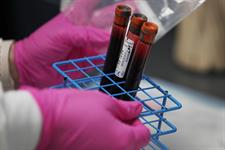Non-commercial medical research spending has fallen by £310m during the coronavirus outbreak and could take over four years to return to pre-crisis levels, an umbrella body has warned.
The Association of Medical Research Charities said that without any financial support its members were projecting a 41 per cent decrease in spend over the next year.
In 2019, they accounted for £1.9bn, or 51 per cent, of non-commercial medical research spend in the UK.
But the membership body said there was already a £310m shortfall this year as a result of the pandemic.
Since the UK went into lockdown in March, AMRC charities reported a 38 per cent loss in fundraising income (compared with March to May last year), leaving many with no option but to pause or stop research, withdraw funding calls, furlough charity staff or make redundancies.
On average, members have furloughed 34 per cent of staff and 18 per cent of spend on research in universities has also been cut or cancelled.
At the end of April, 73 per cent of clinical trials and studies funded by AMRC charities had been paused.
Although trials and studies resumed as lockdown restrictions were eased in June, the number of paused studies and trials had still dropped by 54 per cent.
Some of those might never restart, the AMRC said.
In addition, more than two thirds of AMRC charities are deferring upcoming grant rounds and withdrawing future funding.
The membership body is calling on the government to commit to a Life Sciences-Charity Partnership Fund, a co-investment scheme that would provide a level of match funding for future charity research over the next three years.
Cat Ball, head of policy at the AMRC, said: “Progress towards new treatments and therapies as a result of charity-funded research will drastically impact the lives of people with all kinds of health conditions. Research is a long term process so sustained investment is really important to achieve life-changing benefits.
“The majority of charity-funded research happens in universities and hospitals across the UK. It allows people to gain access to experimental treatments and therapies when they have run out of other options. For some, it is the last resort for extending or improving their quality of life.”
Ball said the AMRC’s proposal was designed to ensure future research could go ahead, by bridging the gap in charity funding caused by the drop in fundraising income.
“We hope to see a decision made in the government’s Comprehensive Spending Review,” she said.
“Many of our members are already making tough decisions, and if we don’t see a tailored and targeted support package in the review, they will be forced to make further cuts to vital research.”
